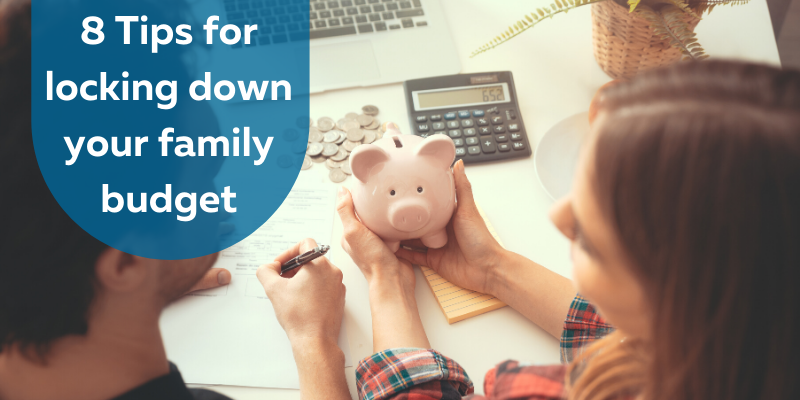8 Tips for locking down your family budget

If you’re living from payday to payday on the edge of your overdraft, it’s time to get budgeting. You don’t deserve the anxiety of peering at your account balance through closed fingers from behind the sofa. A family needs financial responsibility. So reach for your calculator and grab those bank statements. Just a small investment of time could make a big difference to your cash flow. Here are some tips for getting a family budget in place.
1. Fetch the calculator
What’s your cost of living? You might be surprised by the answer. This is your chance to assess your figures realistically. Firstly add up your wages and any other monies to which you may be entitled, such as tax credits and child benefit.
Then comes the less appealing part – the outgoings. Go through your bank statements and make a note of everything that’s zapping your bank balance each month. Be honest. Chuck in everything – rent/mortgage, council tax, utilities, food, services, petrol, loan repayments and credit cards. Even services like Netflix and Spotify need to factored in.
2. Evaluate your outgoings
When you are confronted by a list of your outgoings, it can be something of a reality check. There may be monthly expenses that you have totally forgotten about. Or others that you could wave goodbye to without too much sacrifice. Haven’t used that streaming service in three months? Get rid. Gym membership burning only pounds sterling, rather than calories? It’s free to exercise outdoors! If you’re letting money fly out of your account each month with no visible benefit to your lifestyle, cut loose those costly commitments.
3. Prioritise the essentials
There are some outgoings you really don’t want to fall behind on. Those are the essentials like rent/mortgage, loan repayments, council tax and utility bills. Put your essentials in one column and add up the total. Then you can see how much you have left over for groceries, entertainment and whatnot.
4. Create a separate bank account for essentials
Worrying when the next bill is coming out – or if you will be able to meet it – is no fun. It’s a good idea to create a new bank account for all of your recurring overheads and direct debits. Then when you get paid, you can transfer all the money you need to cover your overheads into a separate account. That way you know your essential bills are covered until your next payday. And your remaining spending money won’t take any unexpected blows.
5. Concentrate on debt
If your bank balance groans at monthly debt repayments, it’s clear you need to take decisive action. Excessive APR eats away at your hard-earned moolah every month, whilst barely making a dent at the balance of debt you owe. A 0% balance transfer credit card can help take the strain off your shoulders, ensuring your repayments pay off tangible debt rather than interest. Just make sure you take note of the interest-free period, which will normally be between 6 and 24 months. After this period the interest payments could be significant, which would be a good time to shop around again. Alternatively if you have multiple loans, it could be worth talking to your bank about getting a consolidation loan. Essentially you will be able to bundle all of your debt into one monthly repayment, which could make things neater and easier to manage.
6. Shop around
Combing through your finances should reveal some simple snips to your outgoings. Your energy bills can almost certainly come down, so use a comparison site such as Compare The Market or Look After My Bills and watch your bills tumble. The same goes for insurance providers and broadband suppliers. Give them a ring and threaten to take your business elsewhere. It’s astonishing how swiftly this can elicit a miraculous price reduction. Lastly, it can be incredibly useful to spend an hour or so with an independent financial adviser. Long-term financial planning can be complicated. But a financial adviser will be able to part the clouds and help you build a roadmap towards a secure financial future.
7. Utilise free tools
Not everyone has the time to see a financial adviser. So consider letting the digital do the hard work instead. There are plenty of online services that’ll take your figures and give you an instant assessment of the way your financial land lays. Need a little more economic intelligence at your fingertips? There are plenty of budgeting apps available. They can visualise your balance, set controls on your spending and future-proof your income.
8. Set goals and watch your progress
Want a family holiday this year? Need to upgrade your car? Planning an extension or a conservatory? Create realistic provisions in your monthly outgoings to work towards life goals. Make a budget work for what you want from life, rather than being a slave to your savings. Having something to save for can be incredibly motivating. Money is there to be enjoyed, not persistently squirreled away like a stash of uneaten nuts.
Over to you!
With just a little planning and effort, you’ll start enjoying your income a whole lot more. And if you are interested, we can reveal an easy way to protect your present while building a nest egg for your future. Here’s how.
Go Back